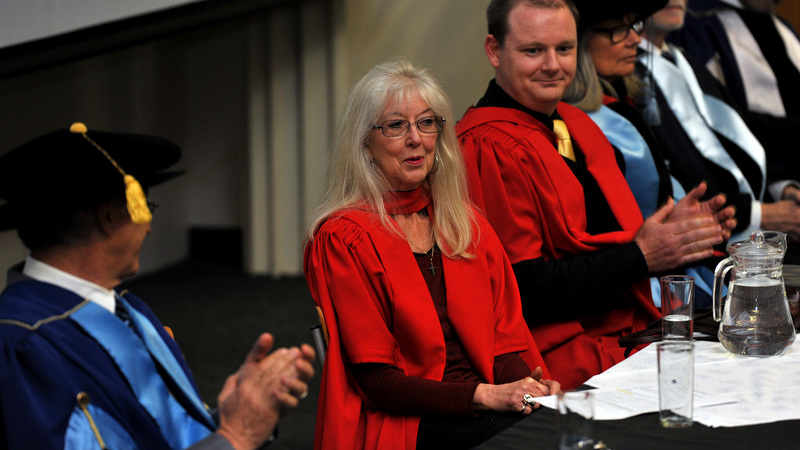Sharing of tax information potentially perilous
01 September 2014 | Story Abigail Calata. Photo Michael Hammond.
Agreements to exchange citizens' tax information is nothing new. In the last five years there has been a lot of activity in the international arena around this issue, however, with countries becoming increasingly enmeshed in ever-widening networks of agreements to share their citizens' tax information.
Professor Jennifer Roeleveld of UCT Department of Finance and Tax does not believe this exchange of information is necessarily a bad thing, but is concerned that it could infringe on people's right to privacy. She also worries that revenue authorities, like the South African Revenue Service (SARS), may be ill-equipped to deal with the sheer volume of information to be shared in what she believes could result in a "tsunami of information exchange".
Roeleveld expressed these views in her inaugural lecture, delivered on 20 August and titled The coming tsunami of information exchange: crashing the shores or lapping the beaches? Her area of expertise is international tax, where the exchange of information '“ "a very powerful weapon against tax evasion" '“ has in recent times moved to the top of the research agenda.
The need for information exchange
The proliferation of agreements and conventions enabling information exchange resulted from countries' need to protect their tax bases, and an increasing concern about base erosion and profit shifting (known as BEPS '“ the new buzzword).
Information exchange has become particularly necessary with the advent of the digital economy worldwide. "There's a lot of uncertainty around where the profits of corporates such as Google and Starbucks should be taxed. Why shouldn't South Africa also get a cut from Google's profits because we might also be generating an income for the company?" she postulated.
Previously countries generally only shared tax information with other countries with whom they had a double tax agreement, and upon request. In 2009 the game changed. G20 countries declared the "era of bank secrecy over" and so-called tax havens, like Switzerland and Luxembourg, committed to information exchange.
The United States of America in a unilateral act forced the world's hand, facilitating agreements for the automatic exchange of information. By 2013, more than 800 tax information exchange agreements (TIEAs) had been signed worldwide, particularly with tax haven countries '“ allowing exchange of information by request where no double tax treaty existed.
"In 2013 the G8 and G20 countries, as well as their central bank governors, committed to the automatic exchange of information," said Roeleveld.
The difficulty with automation
Driven partly by the economic downturn in the United States in 2008/9, this year South Africa signed an intergovernmental agreement (IGA) with the United States. "This means that all qualifying financial institutions (banks, trusts, insurers) will exchange information automatically with the US. This has meant substantial changes to our banking systems probably at a huge cost to you and me. All your information at these institutions will be passed to the US without you knowing about it. It will be done automatically on an annual basis. The first reporting period started on 1 July 2014 with the first report due end February 2015 and then annually thereafter."
Herein lies the rub for Roeleveld, who is "greatly concerned" that taxpayers' information is being shared without them knowing. "Taxpayers [currently] have no right to be informed when they [tax authorities] exchange information. Reputations can be damaged in the process if, for example, the information is incorrect and/or there is leakage, as well as where information has been stolen and sold to revenue authorities, which has happened in Europe."
She is also worried that there will be no benefit for many developing countries, whose revenue authorities will most likely not be able to do much with the massive wave of information heading their way, or have the capacity to comply appropriately with requests for information.
Vote of thanks
Associate Professor Craig West, head of the Department of Finance and Tax, considers it a privilege to have worked alongside Roeleveld for all of the 13 years he has been at UCT, ten of which were spent as Roeleveld's co-researcher in the international tax arena.
He pointed out that another cause for concern regarding information exchange revolves around cost. "The implementation costs are overlooked '“ rather promises (and legal agreements) for exchange are made without consideration of the systems that need to be in place to facilitate such exchange for both the revenue authorities and the taxpayers," clarified West.
He also mentioned Roeleveld's scholarly activism in the field, "Jennifer has actively engaged in a variety of research projects that seek to disseminate the research to decision-making bodies around the world and ensure that the voice of the developing world is heard. It is the study of issues affecting the forgotten that has been the focus of Jennifer's research and whose cause she champions. She further champions the cause of the taxpayer's right to be informed."
Lastly he expressed great admiration for Roeleveld's way of thinking: "I am a fairly structured person in my research, teaching and other activities. Jennifer's artistic nature has led her to think differently and I can only describe my perception of her thinking by analogy. Imagine ideas and principles like rain falling on to a page '“ it scatters everywhere. Now pick up that page and form a cone with the point facing down '“ all those scattered droplets run to the point, gathering all the idea droplets (sometimes seemingly unrelated) to form the pool of knowledge '“ and that is Jennifer's tremendous skill, the gathering together and distillation of ideas and principles '“ a skill she performs with the greatest of ease."
Listen to the audio recording of Prof Roeleveld's lecture
 This work is licensed under a Creative Commons Attribution-NoDerivatives 4.0 International License.
This work is licensed under a Creative Commons Attribution-NoDerivatives 4.0 International License.
Please view the republishing articles page for more information.










